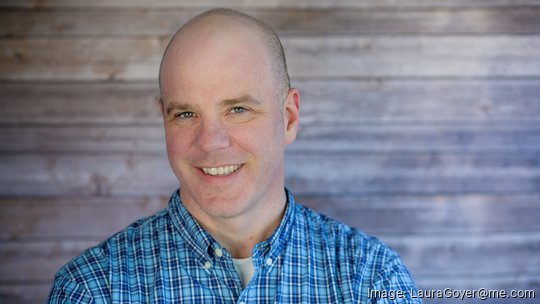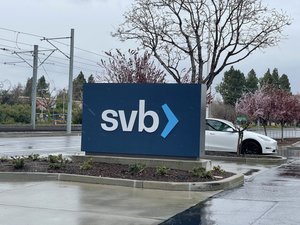
If Joe Saunders could pinpoint the most stressful moment of his work life, the morning of March 9 is definitely a top contender.
That's when the CEO and founder of Tysons Corner cybersecurity company RunSafe Security got a call from an investor about the turmoil at Silicon Valley Bank. The only other moment that came close in recent years was in March 2020, when he was in Germany and former President Donald Trump announced the U.S. border's shutdown due to the spread of Covid-19, and the tech entrepreneur wasn't sure if he'd make it back into the country. (He did.)
But when he learned late last week that SVB was trying to sell $1.75 billion in stock to cover a cash shortfall for deposits, he was told he should probably get RunSafe’s money out of the institution before it was too late. By that Thursday evening, he had a stark decision to make: to take RunSafe Security's money out or keep it in the bank.
Any other Thursday, he said, that would have been an easy call — the fiscally responsible thing would have been to take out the funds. But this Thursday was the day before his payroll was supposed to be processed. That meant he was deciding between a potentially messed up payroll process or an extended risk to make sure his staff paychecks were generated between their usual 6 a.m. and 12 p.m. stretch the next day, on Friday.
“So on Thursday, I did not do anything because I wanted to make sure there were no hiccups with payroll,” Saunders said. “You can imagine when things took a turn for even worse. We were locked out of our bank accounts by 11 a.m. So I couldn't confirm if the payroll had been debited.”
Just like that, RunSafe Security was one of the scores of companies regionally and nationally left in limbo after SVB quickly cratered in the past week, as many of its tech customers pulled out their deposits at once. In its wake, local community banks have worked to reassure their clientele, while startups, investors and biotechs across the region worried about potential funding gaps for their sectors.
For RunSafe Security — which has raised $12.2 million in funding since its 2015 founding, per Crunchbase — it was a series of extreme emotions. At 2:30 pm on March 10, Saunders had to tell his 20 employees, who work daily to fix security holes in systems and devices belonging to such clients as the Department of Defense or GE Aviation, that their employer may not be able to make payroll on March 15.
“It was the most extreme form of panic I have felt in my business career Friday not being able to get into our bank account,” Saunders said. “There was such an urgency and an emotional reaction over not being able to get your company’s money.”
Saunders reached out to his board of directors to explain the situation. Some of his investors offered to help make RunSafe's payroll with their funds. In that moment of crisis, he said, it was the relationships he’d built with his existing and new investors, beyond their dollar bills, that helped shepherd him through the ordeal.
It was eight unending hours being locked out of his accounts before he saw a statement from the Federal Deposit Insurance Corp. around 7 p.m. The regulatory body was taking over SVB and, it said, companies would be able to access their insured deposits by Monday morning.
“Even though there was both panic and fear in the middle,” Saunders said, “by 7 p.m., we got really clear information from the FDIC that there would be money available, come Monday.”
Still, some uncertainty lingered over the weekend for Saunders. The U.S. regulator had yet to declare it would insure all deposits — not just a customer's initial $250,000 typically insured by the FDIC.
Finally, Monday arrived. Saunders could see that RunSafe's payroll had been processed. And he immediately moved the company’s money out of SVB to two banking institutions he declined to name — one, he said, was a large bank and the other was small, both chosen primarily based on their web-based banking applications.
As of today, all of RunSafe Security’s employees have received their paychecks on time. And to this day, Saunders thinks that wouldn't have happened had he removed the company's money and scrambled to set up new bank accounts with his payroll processor. Nevertheless, he's in no rush to relive those moments.
“In any kind of crisis, you have to really take inventory of the important things that matter. And in our case, it was employee payroll. We didn't want to disrupt that and then try to clean things up,” he said. “I valued all the input I got from investors, employees, colleagues, friends, mentors and other CEOs. At the end of the day, you have to make the decision and you base it on your own philosophy, your own principles, in your own rating of the situation and input from your trusted people. And I was comfortable that we made the right decision.”



